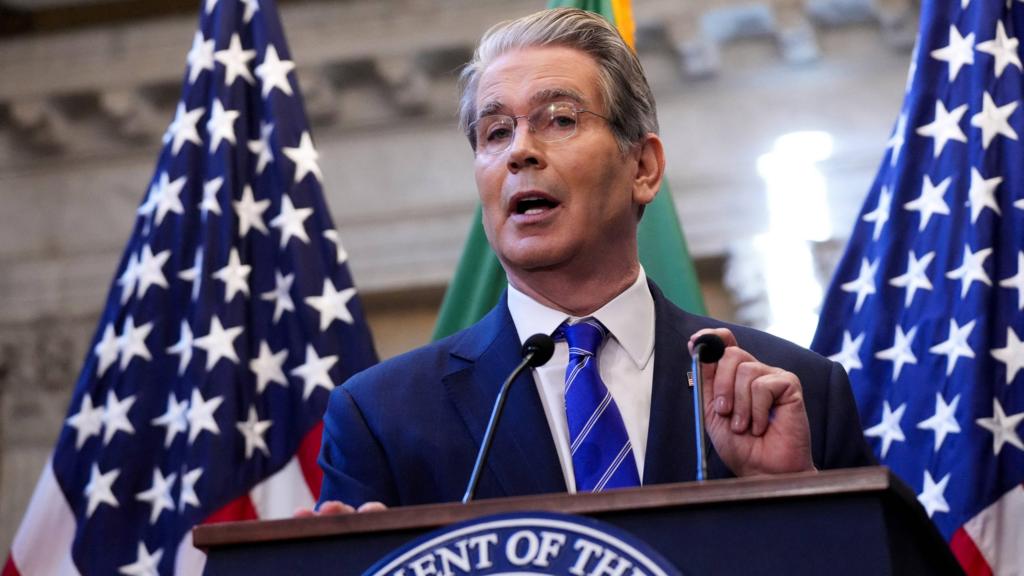“`html
Senior U.S. officials have accused China of reneging on a trade agreement established earlier this year, escalating tensions between the world’s two largest economies.
In a coordinated public statement, U.S. Trade Representative Jamieson Greer and Treasury Secretary Scott Bessent condemned China’s plans to restrict rare earth exports, characterizing them as “economic coercion” and “a global supply chain power grab.”
“If China aspires to be an unreliable partner to the world, then the world will inevitably decouple,” stated Bessent.
Simultaneously, they suggested openness to negotiation, raising doubts about China’s ultimate implementation of the export controls it announced last week.
“The scope and the scale is just unimaginable, and it cannot be implemented,” Greer commented on Wednesday regarding China’s tightened export regulations.
China processes approximately 90% of the world’s rare earths and magnets – materials of critical importance to advanced technology manufacturing, utilized in a wide range of products from automobiles to smartphones.
Its dominance in this sector represents a significant vulnerability for the U.S. in trade discussions, as many American firms are heavily reliant on these materials.
Under Beijing’s new regulations, foreign companies will be required to obtain approval from the Chinese government to export products containing even minor quantities of rare earths, and must provide detailed information on their intended use.
Beijing has also announced similar restrictions on the export of lithium batteries and certain forms of graphite, both of which are essential components of the global technology supply chain.
Last week, President Trump responded to these regulations by threatening to impose an additional 100% tariff on imports from China, effective next month. In a social media post, he also indicated that the U.S. would implement export controls on critical software.
Greer stated that these measures are currently in the drafting stage.
Furthermore, the U.S. and China began imposing new port fees on each other’s ships on Tuesday, further illustrating the strained relationship.
This resurgence in trade tensions, occurring ahead of an anticipated meeting between President Trump and Chinese President Xi Jinping, has sparked concerns about the potential breakdown of the fragile truce between the two trading partners that has been in place since the spring, and a possible return to a full-scale trade war.
In May, the two countries agreed to eliminate tariffs as high as 145%, which had severely hampered trade. Since then, Chinese goods imported into the U.S. have faced an additional 30% levy compared to the beginning of the year, while U.S. goods exported to China have been subject to a new 10% tariff.
Referring to the May agreement, Greer stated, “We have lowered tariffs since that time – but now the Chinese have expanded their export controls.”
Bessent noted that some U.S. automotive companies have already contacted the White House to express concerns about potential supply chain disruptions.
He stated that Beijing’s actions underscore the need for the U.S. and its allies to collaborate, describing the situation as “unacceptable” and “highly provocative.”
“This is China versus the world,” he said. “We and our allies will neither be commanded nor controlled. We are not going to let a group of bureaucrats in Beijing try to manage the global supply chain.”
He indicated that the U.S. has “substantial actions” available, but added, “we’d rather not” take them.
“I believe China is open to discussion and I am optimistic this can be de-escalated,” he concluded.
The detail of this story is enormously complicated, and it is possible the release of witness statements do not signal the end of the saga.
The Tories and Lib Dems had called for witness statements provided to prosecutors to be released.
The maps also omitted “important islands”, the source of competing claims between Beijing and its neighbours.
The Tories have asked the CPS if it would be able to restart prosecutions of two men accused of spying.
The government is facing questions about why the case collapsed just weeks before a trial was due to go ahead.
“`

